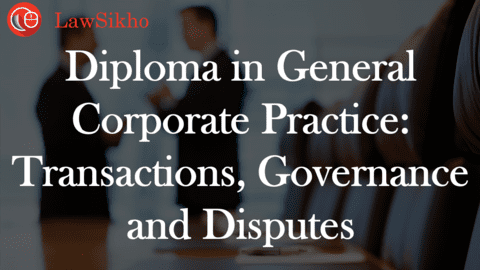This article is written by Aabir Shoaib, pursuing a Diploma in General Corporate Practice: Transactions, Governance, and Disputes from Lawsikho. The article has been edited by Tanmaya Sharma (Associate, LawSikho) and Ruchika Mohapatra (Associate, LawSikho).
Table of Contents
Introduction
After the liberalisation of the economy, financial scams and corporate frauds increased dramatically, and it was time for governments to take action to prevent such frauds from wasting government and public funds. To combat corporate fraud, it became important to re-evaluate and apply rigorous measures. The rising number of white-collar crimes necessitated harsh fines, exemplary punishments, and strong law enforcement. The Satyam scandal, Sahara scam, 2G spectrum scam, and many others are examples of corporate scams that are still pending in various courts around the country or are being investigated by multiple organizations. The Indian government established a Committee on Corporate Governance, which is chaired by Shri Naresh Chandra, former Cabinet Secretary which was designated as the Naresh Chandra Committee, and suggested the establishment of a Corporate Serious Fraud Office which took the form of serious fraud investigation office as we know it today.
The Serious Fraud Investigation Office (SFIO) is an Indian statutory corporate fraud investigation authority. Originally, it was established by a resolution passed by the Government of India on 2 July 2003, and it conducted investigations within the existing legal framework established by Sections 235 to 247 of the former Companies Act, 1956. Eventually, Section 211 of the Companies Act of 2013 provided legislative status to the Serious Fraud Investigation Office (SFIO). It is overseen largely by members from the Indian Administrative Service, Indian Police Service, Indian Corporate Law Service, Indian Revenue Service, and other central government agencies under the jurisdiction of the Ministry of Corporate Affairs, Government of India. The SFIO is a fraud investigation agency established under the Companies Act of 2013 which has the principal occupation of investigating severe, sophisticated frauds committed by persons and/or entities. It is a regulatory agency particularly tasked with resolving and prosecuting white-collar crimes. SFIO has its headquarters in New Delhi along with offices in Chennai, Hyderabad, Kolkata, and Mumbai.
SFIO under the Companies Act, 2013
The SFIO’s professionals are in charge of discovering and resolving crimes in collaboration with the Income Tax Department and the Central Bureau of Investigation. The Office was established in the backdrop of stock market scams that occurred from the 1990s to the 2000s, costing public and government money and resulting in the closure of numerous small and new enterprises. Non-banking financial companies also played a negligent role, which the SFIO helped to correct. To tackle such white-collar crimes, the Naresh Chandra Committee on Corporate Governance proposed that the Vajpayee government establish the SFIO.
SFIO is a multidisciplinary agency with professionals in forensic audits, technology and information technology, law and corporate law, taxation, capital markets, accounting, and other fields. The Director of the Office holds a position similar to that of a Joint Secretary to the Government of India. Even if there is no obvious fraud, the SFIO investigates if the Board is fair and whether minority shareholders are oppressed. It is important to note that SFIO cannot initiate a case on its own and only acts upon the orders given by the Central Government. The SFIO also has the authority to arrest people who are connected to or have participated in the fraud, albeit these powers are limited to the Director, Additional Director, and Assistant Director. The Satyam Scam and the Deccan Chronicle Holding Ltd (DCHL) are two of the most prominent cases handled by SFIO.
Section 210 (1) of the Companies Act, 2013 states that if the Central Government believes it is necessary to investigate a company’s affairs either on receipt of a report from the Registrar or inspector under Section 208 or on intimation of a special resolution passed by a company that the company’s affairs should be investigated or in the public interest it “may” order an investigation.
The word “may” signifies that the Central Government has the discretion to order an investigation. Section 210 (2), on the other hand, is a compulsory provision that specifies that when a Court/Tribunal orders an investigation into the operations of a firm, the Central Government “shall” order one. Section 212 specifies the method for the SFIO’s investigation. Section 212(1) states that, without prejudice to the provisions of Section 210, if the Central Government “is of the opinion” that it is essential for the SFIO to probe the activities of a company on the premises specified in Section 212(1), the Central Government may, by order, delegate the probe to the SFIO.
In the case of Church of South India v. Union of India, the Madras High Court recently concluded that the phrase ‘is of the opinion’ under Section 212 puts a jurisdictional duty on the Central Government to express an opinion on the requirement of an investigation by the SFIO. Any order issued by the Central Government without the formation of an “opinion” under Section 212 shall lack merit.”
Investigation report and its evidentiary value
Under Section 212(3), if the Central Government has directed the SFIO to investigate the affairs of a corporation, the SFIO must undertake the inquiry and submit its findings within the time frame provided in the Central Government order. The SFIO, on the other hand, has no time constraint under the 2013 Act for completing the investigation and submitting the investigation report. This brings up the question of whether the SFIO’s mandate would be terminated if the investigation report is not submitted within the timeframe set in the Central Government decree. The Supreme Court successfully answered this question in the matter of SFIO v. Rahul Modi and subsequently ruled that because Section 212 does not provide a time limit for submitting the investigation report and the authority of SFIO to investigate does not expire once the period specified in the Central Government order has expired. It was determined that the time period mentioned in the order is merely advisory and not necessary. The authority to investigate shall not be terminated when the time limit provided by the Central Government has expired.
According to the Companies Act, 2013, the SFIO shall submit an “interim” report if necessary, or a report “on completion of the investigation” to the Central Government. Section 212(14) provides that upon receipt and after reviewing the investigation report, the Central Government may instruct the SFIO to start prosecution against the corporation and its executives or employees, provided that there is sufficient reason to sustain a charge. In the case of N. Sampath Ganesh v. Union of India, the Bombay High Court held that prosecution can be commenced based on an interim report or an inquiry report as long as it is sufficient to sustain a charge.
The investigation report filed with the Special Court for framing charges must be assumed to be a report filed by a police officer under Section 173 of the Criminal Procedure Code (“CrPC”) which is often referred to as the “charge-sheet”. It is worth noting that in K. Veeraswami v. Union of India, the Supreme Court decided that a final investigation report prepared by an investigating officer under Section 173 of the CrPC is nothing more than the investigating officer’s opinion and shall not be considered legal evidence.
Conclusion
The SFIO is a fraud investigation organisation and has the primary responsibility of investigating serious, sophisticated frauds perpetrated by individuals and/or businesses, and also acts as a regulatory agency entrusted with resolving and prosecuting white-collar crimes in partnership with the Income Tax Department and the Central Bureau of Investigation. SFIO is headed by a Director as Head of Department in the rank of Joint Secretary to the Government of India. The Director is assisted by Additional Directors, Joint Directors, Deputy Directors, Senior Assistant Directors, Assistant Directors, Prosecutors, and other secretarial staff. It also has the authority to arrest people who are connected to or involved in the fraud but only the Director, Additional Director, and Assistant Director have this authority.
Investigation into the affairs of a company is assigned to SFIO, where the Government is of the opinion that it is necessary to investigate the affairs of a company (a) on receipt of a report of the Registrar or inspector under section 208 of the Companies Act, 2013; (b) on intimation of a special resolution passed by a company that its affairs are required to be investigated; (c) in the public interest, or (d) on request from any department of the Central Government or a State Government.
To combat corporate fraud, it became important to re-evaluate and apply rigorous measures. It is important to note that SFIO cannot initiate a case on its own and only acts upon the orders given by the Central Government. For effective enforcement of Section 212, there is an urgent need to scale up the resources and manpower available to the SFIO.
References
3. Serious Fraud Investigation Office – IndiaFilings
Students of Lawsikho courses regularly produce writing assignments and work on practical exercises as a part of their coursework and develop themselves in real-life practical skills.
LawSikho has created a telegram group for exchanging legal knowledge, referrals, and various opportunities. You can click on this link and join:https://t.me/joinchat/L9vr7LmS9pJjYTQ9
Follow us on Instagram and subscribe to our YouTube channel for more amazing legal content.
 Serato DJ Crack 2025Serato DJ PRO Crack
Serato DJ Crack 2025Serato DJ PRO Crack











 Allow notifications
Allow notifications


